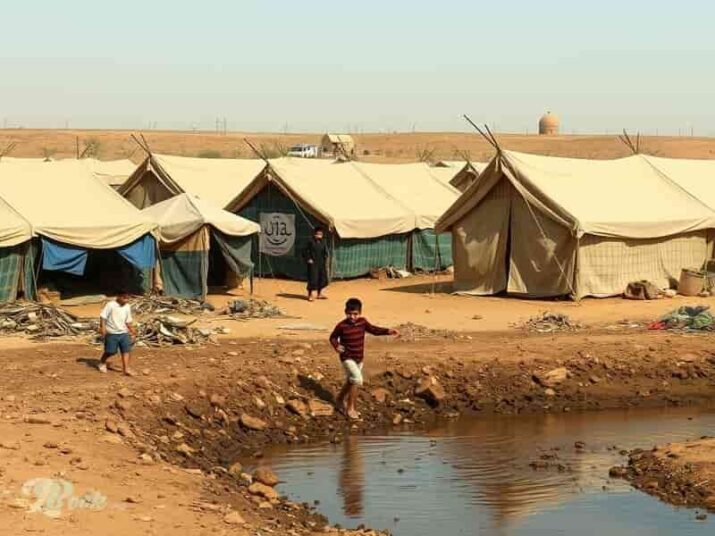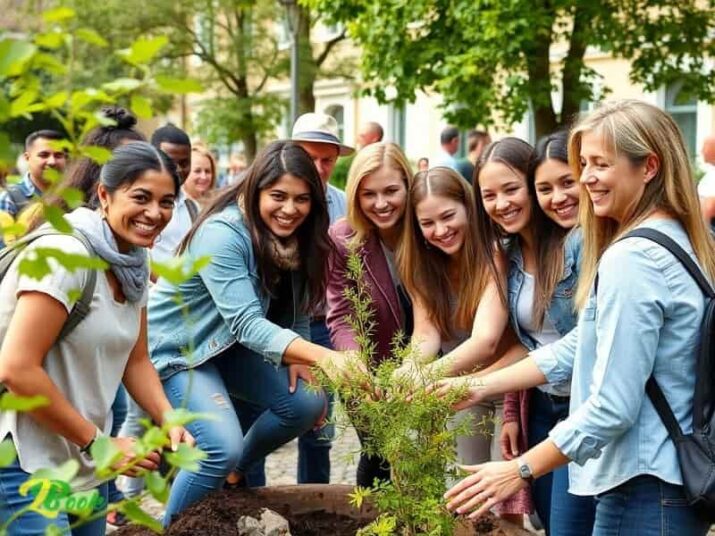Struggle with Negative Energies: A Journey Back to Hope
Introduction
After a twenty-year absence, I returned to my homeland, which has witnessed continuous crises, only to find myself confronted with a painful reality. A nation that was once a symbol of tranquility and love has succumbed to sectarian, political, and economic upheavals. The negative energies that dominate the hearts of many make it difficult to see any hope for the future. My return was a shock, as I faced a sorrowful reality filled with anger and frustration, leading me to recognize the challenges faced by my fellow citizens. In this article, I will explore the challenges I encountered and suggest ways to deal with these negative energies.

The Reality of Negative Energies in the Homeland
Negative energies manifest in society through feelings of anger and frustration that dominate many individuals. These feelings are not momentary; they are the result of long-standing accumulations of crises that the nation has endured. Some feel trapped in a cycle of despair, making it impossible to see any glimmer of hope. This anger reflects on social relationships, where feelings of hatred and division among citizens increase, exacerbating the crisis.
The existence of such negative energies constitutes an obstacle to any efforts for change or construction, making it difficult to achieve any form of stability. In these circumstances, it becomes essential to think about how to confront these challenges and seek ways to foster positivity among individuals and communities.
Feelings of Anger and Frustration
Feelings of anger and frustration are increasing among members of society, negatively impacting their communication and cooperation. Amidst ongoing crises, many feel hopeless about the possibility of change. These feelings lead to a lack of trust in the political and social systems, creating an atmosphere of despair and anxiety. As conditions deteriorate, the ability to think positively or strive for solutions becomes exceedingly difficult. This is reflected in individuals’ behaviors that express discontent, leading to further tensions. Addressing these feelings requires collective efforts, where everyone must collaborate to find effective solutions.
Impact of Crises on Collective Psychology
Recurring crises leave a deep impact on collective psychology, contributing to the formation of a negative culture characterized by chaos and anxiety. The younger generations, especially children and youth, grow up in an environment filled with stress and instability. This affects their aspirations and hopes, making them feel trapped in a dire reality. These psychological effects not only affect individuals but also extend to encompass society as a whole, further complicating the situation. Therefore, we must work on enhancing psychological and social support for the affected groups to ensure mental stability and improve quality of life.
Displaced Persons and Their Harsh Reality
Statistics indicate that the number of displaced persons in the homeland exceeds the number of original residents, reflecting the magnitude of the humanitarian catastrophe faced by citizens. These displaced individuals confront harsh living conditions, with increasing rates of poverty and ignorance among them. The lack of stability makes them susceptible to further crises, amplifying feelings of despair and hopelessness.
Often, displaced persons become victims of violations, whether regarding human rights or access to basic services. This grim reality contributes to widening the gap between the displaced and society, increasing tensions, and deepening chaos. All of us must work towards improving the conditions of these displaced individuals by providing necessary support and resources.
Increase in the Number of Displaced Persons and Its Impact on Society
The large numbers of displaced individuals place additional pressure on resources and services, exacerbating economic and social crises. Displaced persons suffer from a lack of education and healthcare, which threatens their futures. These conditions make it difficult for society to regain stability, as crises turn into a vicious cycle of poverty and ignorance. In these circumstances, cooperation among community members becomes essential to overcome challenges. Proposed solutions should include comprehensive programs aimed at improving the living standards of the displaced and enhancing their opportunities for education and employment.
Poverty and Ignorance as Destructive Factors
Poverty and ignorance are among the most significant factors contributing to the proliferation of negative energies. Many displaced individuals live in harsh conditions, forcing them to make difficult decisions for survival. This situation is particularly detrimental when children are affected, as they grow up without access to education and proper guidance.
This ignorance fosters chaos and sectarian conflicts, further complicating the overall situation. Therefore, we must work on developing educational programs targeting displaced children and youth to ensure they have the necessary opportunities to build a better future.
Crisis of Values and Morality
Human values are noticeably declining in society, with manifestations of hypocrisy and deceit becoming increasingly common. Many people feel compelled to pretend to uphold certain values while living in a reality full of contradictions. This deviation from core values contributes to the spread of chaos, transforming negative behaviors into a way of life. Social relationships are significantly affected, further contributing to feelings of frustration and anxiety. Addressing this crisis requires collective efforts to rebuild human values in society and enhance morality.
Decline of Human Values
Human values face significant challenges amid ongoing crises. People feel they must abandon their principles for survival, leading to the erosion of social bonds. This decline is evident in family and community relationships, where trust and affection lose their place. This deterioration in values poses an obstacle to any efforts for change, making it difficult to build a cohesive society. Therefore, initiatives aimed at promoting human values through education and guidance are crucial.
Spread of Hypocrisy and Deceit
Some individuals live in a state of hypocrisy, displaying values they do not believe in. This behavior becomes a survival mechanism under difficult circumstances, creating an environment of distrust. Social relationships are significantly impacted, making it challenging to forge genuine friendships or foster collaboration. Such practices reinforce division and chaos, complicating matters further. Thus, it is essential to promote a culture of honesty and transparency and to teach individuals the importance of upholding human values.
Economic Challenges and Their Impact on Morale
Economic crises lead to a decline in morale among individuals, with many feeling incapable of improving their situations. Unemployment rates rise, resulting in widespread feelings of frustration and hopelessness. Under these circumstances, thinking about a better future becomes difficult, as focus shifts to daily survival. Economic crises affect not only individuals but also extend to encompass society as a whole, intensifying tensions. Addressing this situation requires collective efforts to rebuild trust in the economic system and boost morale.
Impact of Economic Crises on Daily Life
Economic crises affect all aspects of daily life, with rising prices and dwindling resources. People feel trapped in a system that does not provide the opportunities necessary to achieve their dreams. Feelings of anxiety about the future increase, impacting individuals’ mental health. These pressures heighten feelings of frustration, pushing some to seek illegal or unethical solutions. Therefore, we must work to improve economic conditions by supporting small businesses and providing job opportunities.
Loss of Hope for Improvement
The loss of hope for improvement leads to the proliferation of despair and frustration. Many feel trapped in a closed circle, rendering them incapable of contemplating any solutions. This frustration manifests as negative feelings that affect social relationships, increasing division and alienation among individuals. This situation necessitates collective efforts to rebuild hope and trust in the future by offering support and assistance to individuals and their families.

The Path to Building Humanity
Rebuilding humanity is the only way out of the recurring crises. This requires focusing on education and upbringing as a means to reshape identity and values. There must be a collective effort to promote human values and teach new generations the importance of cooperation and solidarity. Working on building humanity contributes to creating a cohesive society capable of overcoming challenges. Therefore, we must develop educational and cultural programs targeting youth and contributing to enhancing human values.
The Importance of Education in Rebuilding Identity
Education is a powerful tool in rebuilding national identity. It is essential to focus on teaching human values and enhancing the spirit of belonging. This requires updating curricula and providing educational programs that encourage critical thinking and collaboration. Building a new generation that carries these values will positively impact society as a whole. Hence, we must work together to develop education by providing the necessary resources and support to schools and educational centers.
Promoting Human Values in Society
Promoting human values requires collective efforts from all members of society. Workshops and events aimed at enhancing these values among individuals should be organized. Building a culture based on respect and cooperation contributes to improving social relations and strengthening community ties. There must be a clear vision to achieve this goal by enhancing participation in social and cultural activities.
Challenges of Identity and Belonging
National identity faces significant challenges amid the current chaos. Many feel they have lost their sense of belonging, increasing feelings of alienation. This requires efforts to rebuild identity and enhance belonging through culture and the arts. Strengthening national identity contributes to boosting morale and restoring trust among community members. Therefore, we must work on developing cultural programs that promote belonging and enhance national identity.
Searching for Identity Amidst Chaos
Amid the current chaos, many individuals feel their identity is fading. Feelings of alienation and lack of belonging are on the rise, negatively impacting morale. The search for identity becomes essential for individuals to confront challenges successfully. There should be initiatives aimed at promoting cultural and national identity through the arts and social events.
The Role of Culture in Strengthening Belonging
Culture plays an important role in fostering a sense of belonging. Arts and literature can contribute to rebuilding identity and strengthening social ties. Cultural events should aim to promote human values and cooperation among individuals. Strengthening culture contributes to building a cohesive society capable of facing challenges.
Psychological Transformations of Individuals
Ongoing crises have a significant impact on individuals’ mental health. Many suffer from anxiety and depression, affecting their ability to adapt to current conditions. Raising awareness about mental health is a crucial step in overcoming these challenges. Programs aimed at providing psychological and social support to individuals are necessary to ensure an improvement in the quality of life.
How to Deal with Feelings of Frustration
There should be awareness of how to deal with feelings of frustration. Techniques such as meditation and positive thinking can help improve mental states. Mutual support among individuals is essential to help them overcome negative feelings. Building a social support network enhances feelings of belonging and hope, enabling individuals to better face challenges.
The Importance of Psychological and Social Support
Psychological and social support is a crucial element in overcoming crises. Centers that provide support for individuals suffering from mental health issues should be established. Strengthening social bonds improves mental health and enhances individuals’ ability to adapt to challenges. A collective effort is needed to achieve this goal by providing necessary resources and psychological support.
Strategies for Facing Negative Energies
Confronting negative energies requires effective strategies aimed at improving mental health and boosting morale. Focus should be placed on developing individuals’ skills to face challenges. Enhancing cooperation among individuals can contribute to improving the overall situation. Therefore, we should work on developing programs aimed at improving the quality of life and fostering positivity.
Ways to Improve Mental Health
Mental health can be improved through practices such as exercise and proper nutrition. Individuals should be encouraged to engage in activities that enhance their mental well-being. Improving mental health contributes to enhancing the ability to face challenges and achieve goals. Workshops aimed at promoting these practices and providing necessary information to individuals should be established.
Building Community Support Networks
Building community support networks is an important step in facing negative energies. Individuals should be encouraged to collaborate and exchange support with one another. Enhancing the spirit of cooperation contributes to improving social relationships and strengthens individuals’ ability to overcome challenges. Initiatives aimed at fostering these networks through organizing joint events and activities should be implemented.
The Role of Civil Society in Change
Civil society plays an important role in achieving positive change. Initiatives aimed at promoting community participation and raising awareness of social issues should be prioritized. Collective action contributes to improving conditions and enhances individuals’ ability to face challenges. Therefore, we must work on developing programs that encourage active participation and promote individual rights.
The Importance of Community Initiatives
Community initiatives are an effective means of achieving change. Individuals should be encouraged to participate in activities aimed at improving community conditions. Enhancing the spirit of participation contributes to building a cohesive society capable of overcoming challenges. Campaigns aimed at promoting community engagement should be launched by providing necessary resources and support for activities.
Enhancing Cooperation Among Individuals
Focus should be placed on enhancing cooperation among individuals. Promoting a spirit of cooperation contributes to improving social and economic conditions. Programs aimed at strengthening these values among individuals should be developed. Building a cooperative community contributes to achieving common goals and enhances individuals’ ability to face challenges.
Hope for the Future
Despite the significant challenges, hope for the future remains. We must believe in our ability to change and work together to build a better homeland. Strengthening human values and cooperation contributes to creating a positive environment that enables individuals to face challenges. Therefore, we should develop strategies aimed at improving conditions and boosting morale.
A Positive Vision for Change
We must be optimistic about the future and strive to achieve positive change. Collective action enhances morale and restores hope in individuals’ hearts. We should be ready to put in the necessary efforts to achieve this vision by promoting cooperation and providing support for social and cultural activities.
Steps Towards Building a Better Homeland
To build a better homeland, we must work together to strengthen human values and develop education. Improving economic and social conditions contributes to creating a positive environment that enhances morale. Clear steps should be taken to achieve this goal by developing programs and activities that contribute to improving the quality of life.

Recommendations
- Enhancing Education: Focus on education as a fundamental means of building a new generation that embraces human values.
- Raising Community Awareness: Organize workshops and lectures to enhance awareness of the importance of ethics and belonging.
- Providing Psychological Support: Establish support centers to help address psychological crises.
- Encouraging Volunteer Work: Motivate individuals to participate in volunteer activities to foster a spirit of cooperation.
- Developing Small Projects: Support small projects to combat poverty and boost the local economy.
Conclusion
The situation in the homeland requires all of us to work together to rebuild human values and ethics. Despite the difficulties, we must believe in our ability to change and become a beacon of hope in times of chaos. Resilience and positivity are the means to save our homeland from the clutches of negative energies threatening its future.
Therefore, we should all be part of the solution by offering support and assistance to others, enhancing the spirit of cooperation and participation. Collective action and a shared vision are key to building a homeland filled with peace and stability, where every individual can make a difference. Let us begin now to turn hope into reality and build a better future together.
More Human Subjects
- What Remains of Humanity When Emotion and Conscience Fade
- Chaos and Corruption: Challenges After Returning Home
- How Anger Reveals Our Negative Aspects After Conflicts
- Disappointment When Those We Love Do Not Accept Us
- Effects of Poverty on Societies and Social Justice Efforts
- Economic Crises and Their Impact on Human Values
Indifference in Relationships: Causes and Effects







